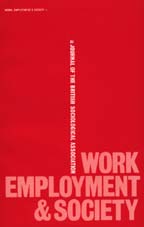Crossref Citations
This article has been cited by the following publications. This list is generated based on data provided by
Crossref.
Baines, Sue
and
Robson, Liz
2001.
Being self‐employed or being enterprising? the case of creative work for the media industries.
Journal of Small Business and Enterprise Development,
Vol. 8,
Issue. 4,
p.
349.
Fraser, Janet
and
Gold, Michael
2001.
`Portfolio Workers': Autonomy and Control amongst Freelance Translators.
Work, Employment and Society,
Vol. 15,
Issue. 4,
p.
679.
Paterson, Richard
2001.
Work histories in television.
Media, Culture & Society,
Vol. 23,
Issue. 4,
p.
495.
Baumann, Arne
2002.
Informal Labour Market Governance: the Case of the British and German Media Production Industries.
Work, Employment and Society,
Vol. 16,
Issue. 1,
p.
27.
Haunschild, Axel
2003.
Managing Employment Relationships in Flexible Labour Markets: The Case of German Repertory Theatres.
Human Relations,
Vol. 56,
Issue. 8,
p.
899.
Hoque, Kim
and
Kirkpatrick, Ian
2003.
Non-Standard Employment in the Management and Professional Workforce: Training, Consultation and Gender Implications.
Work, Employment and Society,
Vol. 17,
Issue. 4,
p.
667.
Heery, Edmund
Conley, Hazel
Delbridge, Rick
and
Stewart, Paul
2004.
Beyond the enterprise: trade union representation of freelances in the UK.
Human Resource Management Journal,
Vol. 14,
Issue. 2,
p.
20.
Platman, Kerry
2004.
‘Portfolio Careers’ and the Search for Flexibility in Later Life.
Work, Employment and Society,
Vol. 18,
Issue. 3,
p.
573.
Haunschild, Axel
2004.
Employment Rules in German Theatres: An Application and Evaluation of the Theory of Employment Systems.
British Journal of Industrial Relations,
Vol. 42,
Issue. 4,
p.
685.
Marsden, David
2004.
The ‘Network Economy’ and Models of the Employment Contract.
British Journal of Industrial Relations,
Vol. 42,
Issue. 4,
p.
659.
Tempest, Sue
McKinlay, Alan
and
Starkey, Ken
2004.
Careering alone: Careers and social capital in the financial services and television industries.
Human Relations,
Vol. 57,
Issue. 12,
p.
1523.
Muehlberger, Ulrike
2005.
Hierarchies, Relational Contracts and New Forms of Outsourcing.
SSRN Electronic Journal,
Ajayi-Obe, Olufunmilola
and
Parker, Simon C.
2005.
The changing nature of work among the self-employed in the 1990s: Evidence from Britain.
Journal of Labor Research,
Vol. 26,
Issue. 3,
p.
501.
Roderick, Martin
2006.
A very precarious profession:.
Work, Employment and Society,
Vol. 20,
Issue. 2,
p.
245.
Dean, Deborah
2007.
Performing industrial relations: the centrality of gender in regulation of work in theatre and television.
Industrial Relations Journal,
Vol. 38,
Issue. 3,
p.
252.
Antcliff, Valerie
Saundry, Richard
and
Stuart, Mark
2007.
Networks and social capital in the UK television industry: The weakness of weak ties.
Human Relations,
Vol. 60,
Issue. 2,
p.
371.
Dickinson, Roger
2007.
Accomplishing Journalism: Towards a Revived Sociology of a Media Occupation.
Cultural Sociology,
Vol. 1,
Issue. 2,
p.
189.
Muehlberger, Ulrike
2007.
Hierarchical Forms of Outsourcing and the Creation of Dependency.
Organization Studies,
Vol. 28,
Issue. 5,
p.
709.
Henninger, Annette
and
Gottschall, Karin
2007.
Freelancers in Germany's Old and New Media Industry: Beyond Standard Patterns of Work and Life?.
Critical Sociology,
Vol. 33,
Issue. 1-2,
p.
43.
Schnell, Christiane
2008.
PUBLIC GOOD OR FREE MARKET?.
European Societies,
Vol. 10,
Issue. 4,
p.
635.




